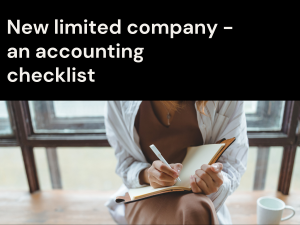For small businesses, cloud accounting can be a game-changer. With cloud accounting, businesses can access their financial data and records from anywhere, at any time. This is a huge benefit for businesses that don’t have the resources to invest in expensive on-premise accounting software and hardware.
In addition, cloud accounting is much more affordable than on-premise accounting solutions. Unlike traditional accounting software, a cloud accounting system offers businesses the chance to use real time financial data to action vital decisions, whilst providing faster and easier ways to oversee their day to day accounting and bookkeeping.
Overall, cloud accounting solutions provide a number of advantages for small businesses. From allowing small businesses to save money on upfront costs, as well as on ongoing maintenance and support expenses, to being highly scalable so that businesses can easily add or remove users as their needs change, a cloud accounting system comes highly recommended in 2022 and beyond.
But if you’re new to the world of cloud accounting, you might be wondering exactly how it works and exactly why your business should consider it. We tell all below.
What is cloud accounting and how does it work?
Cloud accounting software is a type of online accounting software that is hosted on a remote server, and then accessed through a web-based application. Because it is hosted on the internet, it is referred to as ‘in the cloud’ just like any other cloud computing application.
Users of cloud accounting solutions send information to the cloud, where it is encrypted, processed, stored and then returned to them.
A powerful selling point of cloud based software is that it can be accessed by anyone authorised simply using an internet connection via a cloud application service provider, making it flexible and scalable.
When a business uses cloud accounting software, it no longer has to set up individual PCs with specialised accounting software because employees can log in not only from their own devices, but also from wherever they happen to be based.
This helps remote teams or financial branches in particular to access real time data using the same version of the software.
The benefits of cloud accounting software
As we’ve already seen, a cloud accounting solution is a great option for small businesses. It allows a business to access its financial data from anywhere, at any time, and allows that accounting data to be shared with a small business accountant or bookkeeper, making it easy to stay on top of your finances. But cloud accounting also offers a number of other benefits, including:
Secure access from anywhere
One of the key benefits of cloud accounting software is that accountants, bookkeepers, directors, or even employees can access financial data, financial reporting or other important financial information from anywhere.
Not only is this extremely useful for needing to quickly assess business finances, or make important decisions in a short space of time, it also helps small businesses that specialise in finance to offer remote or flexible working options too.
A constantly up to date view of your business
When your data is all stored in the cloud, you’ll have a fully up-to-date picture of your present financial position. As a result, this allows you to make informed financial decisions for your small businesses future.
In contrast, traditional accounting methods are unable to provide you with real-time financial data at all times.
Opportunities for automation and collaboration
A majority of cloud accounting software allows for certain tasks to be automated. As a result, these automated tasks can save crucial amounts of time. For example, you might automate paying your suppliers on the same due date each month by entering their information and creating a procedure that automatically pays them. You can also automate sending out bills to your regular clients.
Likewise, collaboration becomes much easier using cloud solutions. For accountants, collaborating with clients becomes much easier and quicker when a cloud-based accounting software allows for easy sharing and access of key data.
Less room for mistakes
When all required details and information are recorded in the same spot, there are virtually no accounting mistakes to worry about. When an employee has to input numerous pieces of information in a number of locations, however, errors occur significantly more frequently.
Plus, with cloud accounting you can get an up-to-date report at any moment if you enter expenses and income on a regular basis and categorise transactions. Cloud accounting software just requires you to enter your income and expenditures on a regular basis, as this way you can expect accurate results.
3 reasons to switch to cloud based accounting software
Cloud accounting is the future. Even if your company’s existing approach works well right now, you should consider changing at some point in time. But when should you make the transition? Let’s look at some of the reasons that might indicate it’s time for your business to switch.
You or your team are struggling with your workload
A cloud accounting platform enables and allows for automated bookkeeping, cash collection, and bank reconciliation. Automation of these usually time-consuming tasks can considerably lighten a team’s otherwise heavy and administrative workload.
You need faster, or more accurate, financial insights
If you and your management team are finding an increasing need to have immediate access to real-time reporting and financial intelligence to make well-informed decisions that could potentially streamline your business processes, it’s time to consider cloud accounting.
Cloud accounting software ensures your decisions will be based on all the accurate and recent numbers, insights, and key data you need by pulling them in live time from easily accessible and understandable dashboards.
You want to save on your taxes
Simply put, paying your taxes is easier and faster when you use cloud accounting software. Transactions will be recorded immediately, allowing you to export them into the appropriate tax return templates and send them digitally as needed. But better yet, with real time information, your accountant can review your taxes during the year and identify savings and opportunities before the tax year ends. This can help you pay less tax overall.
Tips for using cloud accounting successfully
Choose the right cloud software provider
The cloud accounting market is growing, which means there’s a number of different available cloud accounting providers available to businesses. Because of this, it’s vital that small businesses choose the right cloud providers for their needs.
Before settling on a cloud provider, assess the security and safety of the software provider, its encryption level, and the available features. For example a sole trader with one or two additional employees is unlikely to need the same accounting features as a limited company with fifteen to twenty employees as their accounting and bookkeeping needs will greatly differ.
Employ a cloud accounting certified accountant
At the rapid speed with which technology is moving, it’s a safe bet to employ an accountant who offers cloud based accounting services. Not only are they more efficient and productive working within cloud accounting, but they can also discover new methods to benefit the business from it in some way.
Accountants that are trained in cloud-based technology can even assist the firm in finding new online tools and services that can help the business grow and advance.
Bridge business gaps for business growth
The accounting portion of a business is only one aspect of its overall structure. Accounting applications like Intuit’s QuickBooks can integrate easily with other company departments like Human Resources, payroll, inventory management systems, merchant services, banking, CRM software, and work-flow apps. That’s why it’s important to integrate cloud accounting software with other business applications.
How to get started with cloud accounting
Whether you’ve already made the transition to online accounting or are just getting started on your path, we can help.
Online accounting is a powerful tool for small business owners looking to manage their finances in the most time and cost-effective manner, with its simplicity of use, automation of formerly time-consuming activities, scalable software, real-time financial insights, and prompt Making Tax Digital compliance.
However, in order to securely transfer your financial information to the cloud and take advantage of what cloud accounting has to offer, you’ll need the help of some online accountants who are chartered accountants, and small business accounting experts. That’s where we come in!
We can recommend different online accounting platforms, help to transfer your sensitive financial information into your piece of chosen online accounting software, or we can recommend ways to get the most out of the software you’re already using to ensure that your accounting software is keeping you compliant, efficient and productive.
Find out more: Book a free, no obligation chat with us.






